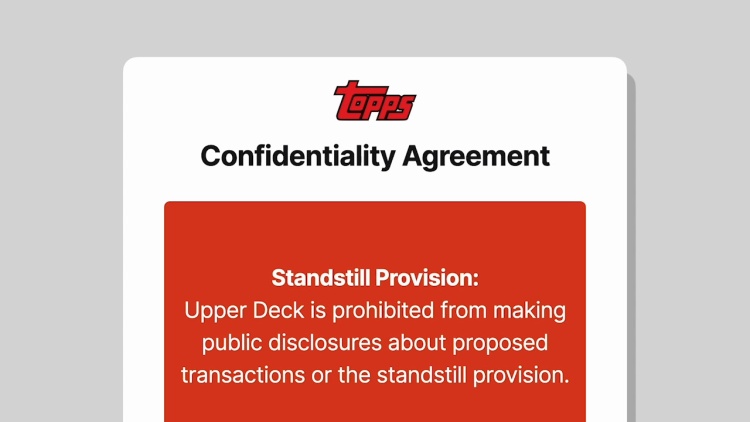In re The Topps Company Shareholders Litigation
Delaware Court of Chancery
926 A.2d 58 (2007)
- Written by John Caddell, JD
Facts
Arthur Shorin, son of the founder of The Topps Company, Inc. (defendant), has been chairman and CEO of Topps since 1980. Topps’ performance began to falter in the early 2000s and Topps began to consider a sale of its business. Michael Eisner approached Shorin, expressing interest. He proposed a merger at $9.24 per share, which the board negotiated upward to $9.75 per share. The board entered into a merger agreement with Eisner at that price, which permitted Topps to shop for other bids for 40 days and to accept a “superior proposal” subject only to a termination fee to be paid to Eisner. Eisner expressed to Shorin and others at Topps that he intended to keep Shorin and substantially all of the rest of the company’s management in place after the merger. During the 40-day shop period, the only party to express interest was Topps’ main competitor, The Upper Deck Company (plaintiff). Near the end of the period, Upper Deck expressed willingness to pay $10.75 per share, subject to financing and other conditions. Topps had the option under the merger agreement to designate Upper Deck as an Excluded Party and to continue negotiating after the 40 days. Topps declined to do so, opting to move forward and submit the Eisner merger proposal to the shareholders for a vote. After the 40-day period, Upper Deck made another unsolicited offer at $10.75 per share, without a financing condition. Topps did not seriously consider this proposal. Topps’ statement to the shareholders on the Eisner merger did not accurately reflect the seriousness of Upper Deck’s proposals. It also did not disclose that Eisner had promised to retain management figures after the merger. Topps had required Upper Deck to enter into a Standstill Agreement which prohibited Upper Deck from negotiating or engaging directly with Topps’ shareholders. A group of Topps shareholders (plaintiffs), along with Upper Deck, sued Topps and moved for a preliminary injunction blocking the shareholder vote on the Eisner merger.
Rule of Law
Issue
Holding and Reasoning (Strine, J.)
What to do next…
Here's why 907,000 law students have relied on our case briefs:
- Written by law professors and practitioners, not other law students. 47,100 briefs, keyed to 996 casebooks. Top-notch customer support.
- The right amount of information, includes the facts, issues, rule of law, holding and reasoning, and any concurrences and dissents.
- Access in your classes, works on your mobile and tablet. Massive library of related video lessons and high quality multiple-choice questions.
- Easy to use, uniform format for every case brief. Written in plain English, not in legalese. Our briefs summarize and simplify; they don’t just repeat the court’s language.





